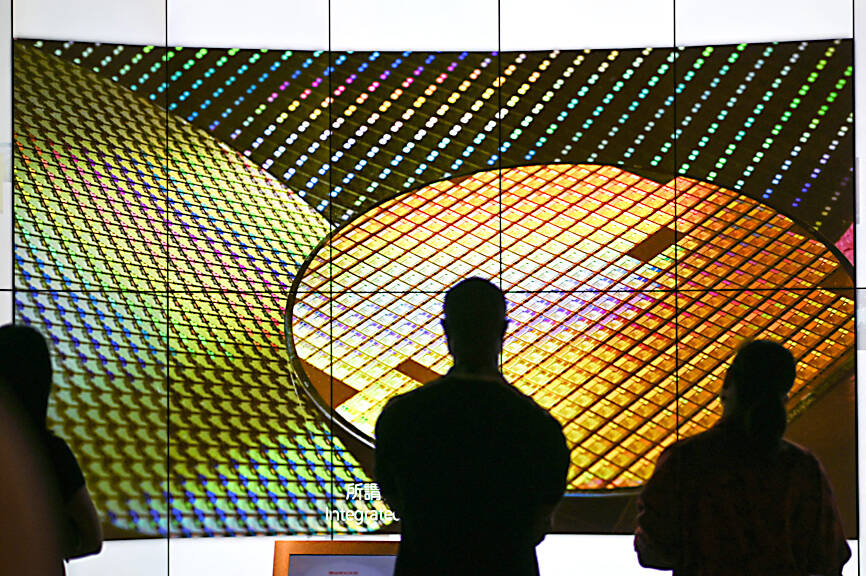Taiwan Semiconductor Manufacturing Co’s (TSMC, 台積電) global capacity expansion would help it minimize its asset concentration risk and assuage major customers’ concerns about supply chain resilience amid geopolitical tensions in the long term, Taiwan Ratings Corp (中華信評) said in a report yesterday.
The ratings agency released the report on the heels of TSMC’s announcement on Tuesday that it planned to build a new wafer manufacturing facility in Dresden, Germany, through a joint venture with its customers Robert Bosch GmbH, Infineon Technologies AG and NXP Semiconductors NV.
“We believe this [German] investment is in line with TSMC’s long-term strategy to increase its global footprint, partly in response to major client concerns over geopolitical tension,” Taiwan Ratings said.

Photo: Sam Yeh, AFP
The joint venture is likely to take advantage of the eurozone’s 43 billion euros (US$47.4 billion) subsidy program, which aims to cultivate the local semiconductor supply chain, it said.
As Taiwan would continue to be the major manufacturing hub for the company’s most advanced technologies — 2-nanometer and 3-nanometer — the company’s overseas expansions in the US, Japan, Europe and China are “unlikely to materially lower its geographic concentration risk over the next two years,” the report said.
As of the end of last year, Taiwan generated 90 percent of TSMC’s overall wafer capacity, and the company has said it intended to shift 20 percent of its capacity using 28-nanometer and below technologies beyond Taiwan over the next few years.
With those overseas investment expansions unfolding, TSMC would encounter higher manufacturing costs and margin dilution, but the company should be able to minimize such adverse impacts on its profitability, thanks to customers’ strong demand and the governments’ support to build local semiconductor supply chains, the report said.
In addition, TSMC’s overseas expansion would help the company better manage the increasingly tight supply of water, green power and talent in Taiwan, it said.
Taiwan Ratings said the planned German fab would have a low financial impact on TSMC’s debt leverage this year and next year, as the major spending on equipment would come two to three years later.
The agency expects TSMC’s capital expenditure to be US$32 billion to US$36 billion this year and next year, compared with last year’s US$36 billion, due to weakening demand.
Lower capital spending should help strengthen the company’s financial buffer, it said.
TSMC is forecast to generate NT$100 billion to NT$150 billion (US$3.15 billion to US$4.72 billion) in free cash flow this year, despite weaker profitability and a moderate increase in the company’s cash dividends, it added.

TAKING STOCK: A Taiwanese cookware firm in Vietnam urged customers to assess inventory or place orders early so shipments can reach the US while tariffs are paused Taiwanese businesses in Vietnam are exploring alternatives after the White House imposed a 46 percent import duty on Vietnamese goods, following US President Donald Trump’s announcement of “reciprocal” tariffs on the US’ trading partners. Lo Shih-liang (羅世良), chairman of Brico Industry Co (裕茂工業), a Taiwanese company that manufactures cast iron cookware and stove components in Vietnam, said that more than 40 percent of his business was tied to the US market, describing the constant US policy shifts as an emotional roller coaster. “I work during the day and stay up all night watching the news. I’ve been following US news until 3am

UNCERTAINTY: Innolux activated a stringent supply chain management mechanism, as it did during the COVID-19 pandemic, to ensure optimal inventory levels for customers Flat-panel display makers AUO Corp (友達) and Innolux Corp (群創) yesterday said that about 12 to 20 percent of their display business is at risk of potential US tariffs and that they would relocate production or shipment destinations to mitigate the levies’ effects. US tariffs would have a direct impact of US$200 million on AUO’s revenue, company chairman Paul Peng (彭雙浪) told reporters on the sidelines of the Touch Taiwan trade show in Taipei yesterday. That would make up about 12 percent of the company’s overall revenue. To cope with the tariff uncertainty, AUO plans to allocate its production to manufacturing facilities in

Six years ago, LVMH’s billionaire CEO Bernard Arnault and US President Donald Trump cut the blue ribbon on a factory in rural Texas that would make designer handbags for Louis Vuitton, one of the world’s best-known luxury brands. However, since the high-profile opening, the factory has faced a host of problems limiting production, 11 former Louis Vuitton employees said. The site has consistently ranked among the worst-performing for Louis Vuitton globally, “significantly” underperforming other facilities, said three former Louis Vuitton workers and a senior industry source, who cited internal rankings shared with staff. The plant’s problems — which have not

COLLABORATION: Given Taiwan’s key position in global supply chains, the US firm is discussing strategies with local partners and clients to deal with global uncertainties Advanced Micro Devices Inc (AMD) yesterday said it is meeting with local ecosystem partners, including Taiwan Semiconductor Manufacturing Co (TSMC, 台積電), to discuss strategies, including long-term manufacturing, to navigate uncertainties such as US tariffs, as Taiwan occupies an important position in global supply chains. AMD chief executive officer Lisa Su (蘇姿丰) told reporters that Taiwan is an important part of the chip designer’s ecosystem and she is discussing with partners and customers in Taiwan to forge strong collaborations on different areas during this critical period. AMD has just become the first artificial-intelligence (AI) server chip customer of TSMC to utilize its advanced